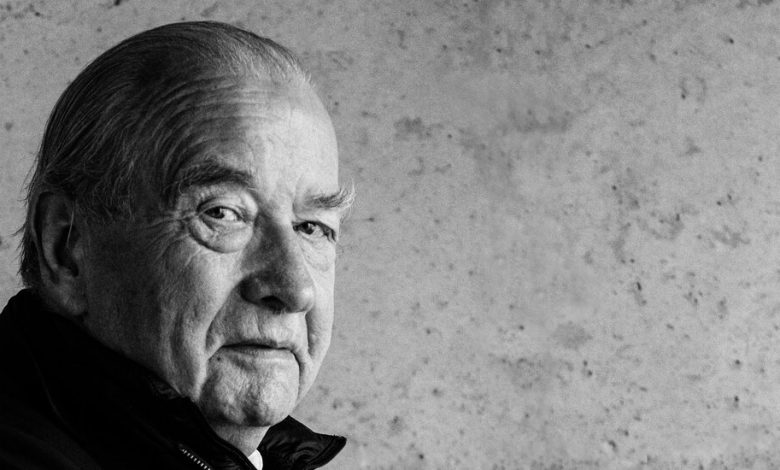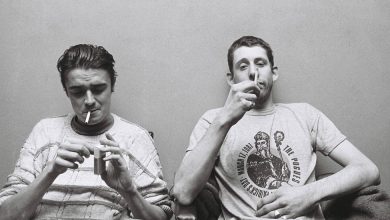Michel Ciment, Eminent French Film Critic, Is Dead at 85

Michel Ciment, a French film critic whose passion for cinema helped define it as serious art for generations of French moviegoers, directors and producers, even while irking some of them with his unabashed love of American film, died on Nov. 13 in Paris. He was 85.
His death was confirmed by the film magazine Positif, for which he had long served as editor in chief, and by the Cannes Film Festival, which called him “a free spirit with an insatiable curiosity” and “the embodiment of cinephilia.”
Mr. Ciment (pronounced SEE-mah) derived his authority from just that: his unbounded love of movies and an encyclopedic knowledge of film that sprang from it. He was an adept of the uniquely French cult of movies as high art, and of the great director as genius. But that was counterbalanced by an embrace of “all types of cinema,” the Cannes festival said, a passion born in his childhood addiction to American westerns and gangster movies.
Mr. Ciment was an unabashed Americanophile in a French cultural environment in which checking the anti-American box is often a prerequisite to being taken seriously. He was sometimes reproached for it, his son Gilles recalled; in later years he became a senior lecturer in American Civilization at the University of Paris.
He communicated his enthusiasm for film, beginning with his first critical forays in the early 1960s, in a torrent of books, reviews, interviews and radio broadcasts. (His status in the world of film criticism was such that he was often interviewed by other critics.)
Mr. Ciment celebrated the great directors of the 1950s, ’60s and ’70s in books on Joseph Losey, Stanley Kubrick, Elia Kazan and Francesco Rosi, each thick with probing interviews in which critic startles director with his detailed knowledge of their films.
These directors trusted him and opened up to him because, he told the Toronto Film Review in 2020, “I asked questions that were about philosophy, about history, about politics.”
His son recalled: “They would say that an exchange with Michel Ciment was like nothing else. With him, he really knows your film, he remembers the characters’ names. And then he would put your film in relation to the history of cinema.”
For his book “Kazan on Kazan” (1973),Mr. Ciment spent 10 days with the director and conducted 40 hours of interviews. That was typical of his methods. He favored those who believed, like him, that “all the arts are found in cinema,” as he put it to an interviewer this year with the radio channel France Culture. For him, the superior film combined visual, aural and literary greatness.
“All the great directors I hung out with — whether it was Losey, Kubrick, Kazan — they had a generalized culture,” Mr. Ciment said in the radio interview. “These were people who had read an enormous amount, who listened to music, who had seen lots of paintings.”
He criticized contemporary directors like Quentin Tarantino, who, he said, work in a cruder idiom and have “encouraged the young toward an absence of culture.”
The son of a Hungarian-Jewish immigrant tailor who narrowly escaped being rounded up with other Jews in Paris by Nazi collaborators during World War II, Mr. Ciment traced his pro-American views to childhood memories of the liberation of France in 1944.
“At 6, to see the Americans disembark, pitching cans of food, chewing gum — it’s thanks to them we regained our liberty,” he told France Culture.
In contrast to the sometimes doctrinaire impulses of that other pole of French film criticism, the magazine Cahiers du Cinema, where directors like Jean-Luc Godard and François Truffaut propagated theories of cinema that they went on to put into practice, Mr. Ciment’s instinct at Positifwas free-form.
“Always a bit anarchist, libertarian, we couldn’t have cared less about fashions,” he told the Toronto Film Review. “We said what we thought about films, what we loved about films, without preconceptions.”
His serious approach to film is evident in his book about the politically oriented realist Italian director Francesco Rosi, who made films about the mafia, corruption, injustice and war. Implicit in the book is the idea that film is as worthy of close analysis as serious literature, a view Mr. Ciment gained from his early studies with two postwar French masters of literary and philosophical criticism, Paul Benichou and Gilles Deleuze.
Mr. Ciment praised Mr. Rosi for “hunting down the lie, cornering it in its hide-out,” for a “close engagement with reality in which the smallest false step would have been a betrayal,” and for being “conscious of the impossibility of reaching the truth.”
Even in this early book, Mr. Ciment’s attention to detail in film is evident: At one point, referring to Mr. Rosi’s antiwar film “Many Wars Ago” (1970), he asks the director why “the night battle sequence is predominantly blue in color.”
Michel Jean Ciment was born on May 26, 1938, in Paris to Alexander and Helene Cziment. His father “Frenchified” the name after the war, Gilles Ciment said. Michel’s father, who had immigrated from Hungary in the early 1920s, was a tailor for the great French fashion houses, and his wife worked with him.
One morning in July 1942, the police came by the house to warn Helene that her husband had best not come home that evening: It was the eve of the great roundup of Paris Jews known as the Vel’ d’Hiv, named after the stadium where they were taken. Some 13,000 Jews were seized and subsequently sent to the death camp at Auschwitz.
The elder Mr. Ciment escaped to Normandy and was hidden by peasants there for the duration of the war. His son followed him there, and his wife went back and forth from Paris.
The family regrouped in Paris after the Liberation, and Michel Ciment went on to study at two prestigious secondary schools, the Lycée Louis-Le-Grand and the Lycée Condorcet. It was as a student that he discovered, in the intense Paris film culture of the day, the great silent films of Erich von Stroheim, F.W. Murnau and Fritz Lang.
He later studied at the Sorbonne and received a Fulbright Scholarship in the early 1960s, allowing him to study at Amherst College in Massachusetts. “It was American education that completely confirmed me in my tastes,” Mr. Ciment told France Culture.
He made his debut as a critic with a defense of Orson Welles in Positif in 1963. He later joined its staff and went on to become editor in chief.
From the 1970s on he published a stream of books. Besides the ones on Kazan and Rosi, there were others on American cinema, Losey, Stanley Kubrick and Theo Angelopoulos as well as “Passport to Hollywood,” a book of interviews with directors, including Roman Polanski, Milos Forman and Wim Wenders.
In addition to his son, he is survived by his second wife, Evelyne Hazan-Ciment. His first wife, Jeannine Ciment, who worked with him at Positif, died in 1986.
Mr. Ciment’s passion for film never flagged. As Jérôme Garcin, his colleague on the popular French public radio cultural review “Le Masque et La Plume,” said of him in the French magazine L’Obs, “At 85, he remained, when the lights went out and the magic lantern began to dispense onscreen its dream-colors, a child in wonderment.”




